ALL PULP REVIEWS- by Ron Fortier
THE BLACK BADGE
Deputy Unites States Marshall Bass Reeves
From Slave to Heroic Lawman
By Paul Brady
Milligan Books, Inc.
202 pages
At the age of sixteen years old, runaway slave Bass Reeves
left the Texas plantation where he had been raised and fled into the Indian
Territories. There he lived with
the Five Civilized Tribes and fought with the Creek and Seminole on the side of
the Union in the Civil War. After
that conflict, Reeves married and started a horse ranch. Shortly thereafter he was recruited by
Circuit Court Judge Isaac Parker to become one of the first ever African
American Deputy U.S. Marshalls. In
his thirty-two years as a lawman, he achieved one of the most impressive
records ever recorded in the annals of west. He captured well over three thousand felons, was involved
with fourteen major gun-battles and was only wounded once.
An expert marksman with both carbine and pistols, Reeves was also a
formidable tracker who knew the frontier lands like the proverbial back of his
hands.
The tragic irony of his life is that as an adult, he served
the law believing it would forever change the plight of minority groups for the
better. And it did just that in
the Indian Territories where Judge Parker treated all felons to the same
justice with no regard to their sex or race. But when the Federal Government moved in by the late 1890s
to accept Oklahoma as a state, it opened the floodgates to allow white settlers
to swarm the land like human locust.
Most of them were racist; having no desire to share the bounty of the
frontier with either the red or black man. Caught in the middle, lawman Reeves watched the newly formed
state enact equal-but-separate laws that were the legal antithesis of the
Emancipation Proclamation and by the time of his passing in 1910 at the age of
72, racism was fully entrenched in Oklahoma. And with that white supremacist mentality in place, is it
any wonder that the remarkable life and career of this man were purposely
expunged by white historians chronicling the history of the west?
Thankfully the indomitable spirit of freedom and justice
prevailed and by the sixties the Equal Rights Movement swept across the land
correcting those injustices once and for all. With that came two authentic histories of Bass Reeeves. “The Black Badge,” written by Paul
Brady, a respected Federal Administrative Law Judge serving 25 years on the
bench and the grand-nephew of Bass Reeves was released in 2005. It preceded “Black Gun, Silver Star”
authored by Prof. Art T. Burton published in 2008. Both books are excellent and worthy of your attention. Whereas Burton’s is definitively more
complete and scholarly account, Brady’s is wonderfully full of personal
anecdotes handed down to him by his elder relatives, many of whom actually knew
Bass Reeves personally. It is
interesting to note there are several major discrepancies concerning Reeves
younger days in regards to his parentage and name. None of which is surprising considering the lack of personal
records afforded slaves save for very few property accounts found on
plantations after the Civil War.
Basss Reeves was the greatest lawman who ever rode the Wild
West. His adventures are legendary
and all the more fantastic because they were all true. If, like this reviewer, you grew up
fascinated by the stories of Wyatt Earp, Wild Bill Hickock , Bat Materson and
all those others made famous in books and movies, you owe it yourself to pick
up this “The Black Badge” and meet the Bass Reeves. It is an experience that will open your eyes and maybe even
your heart.

